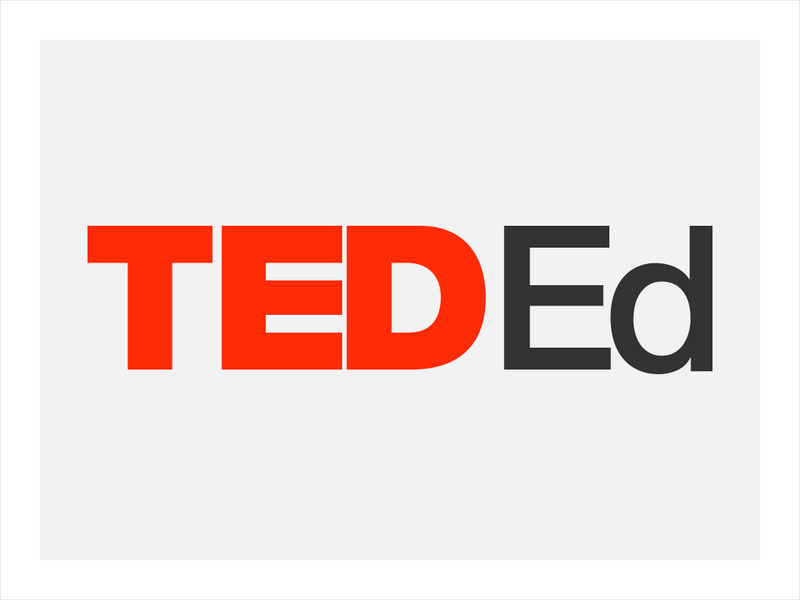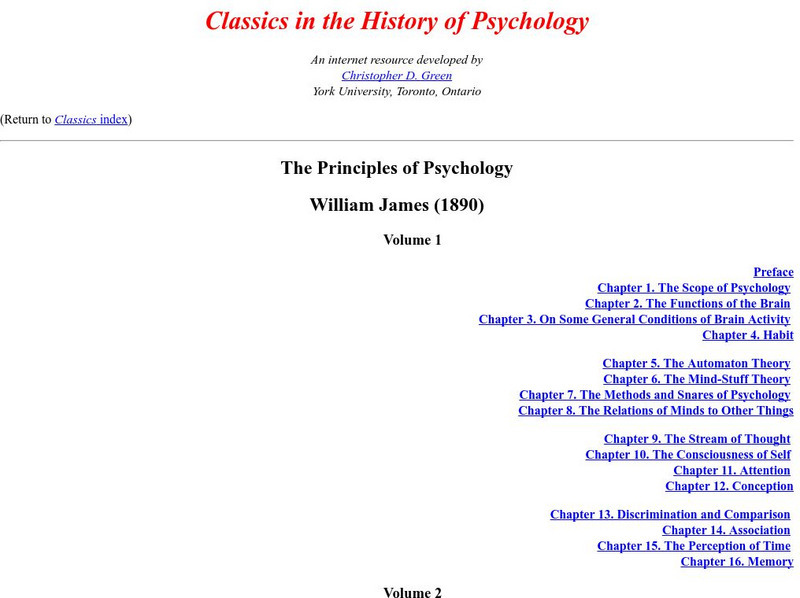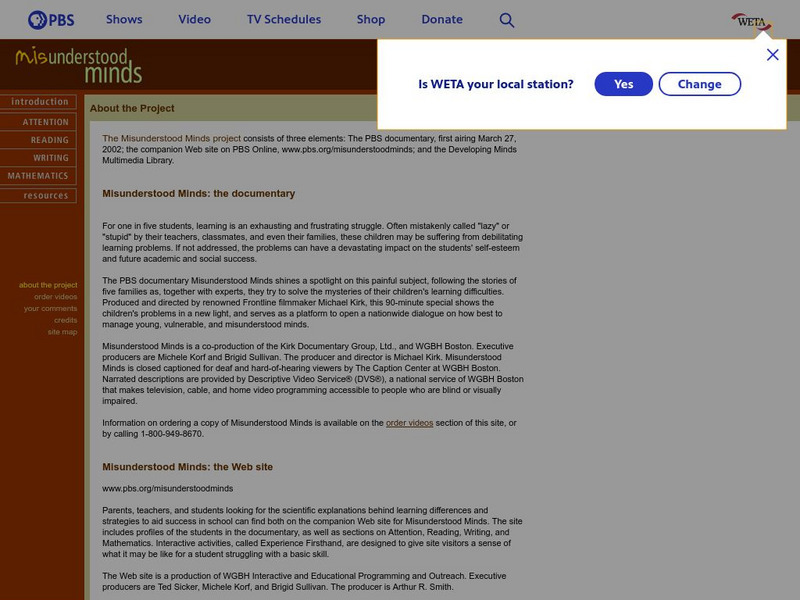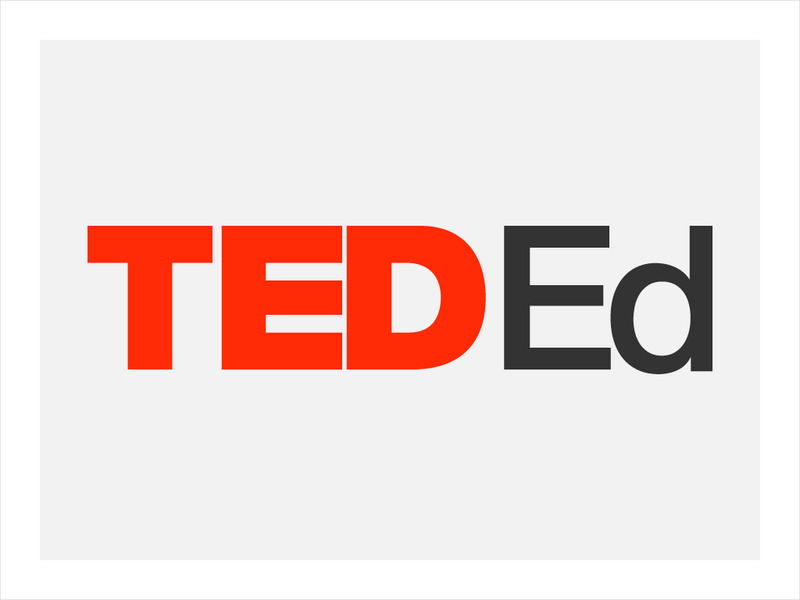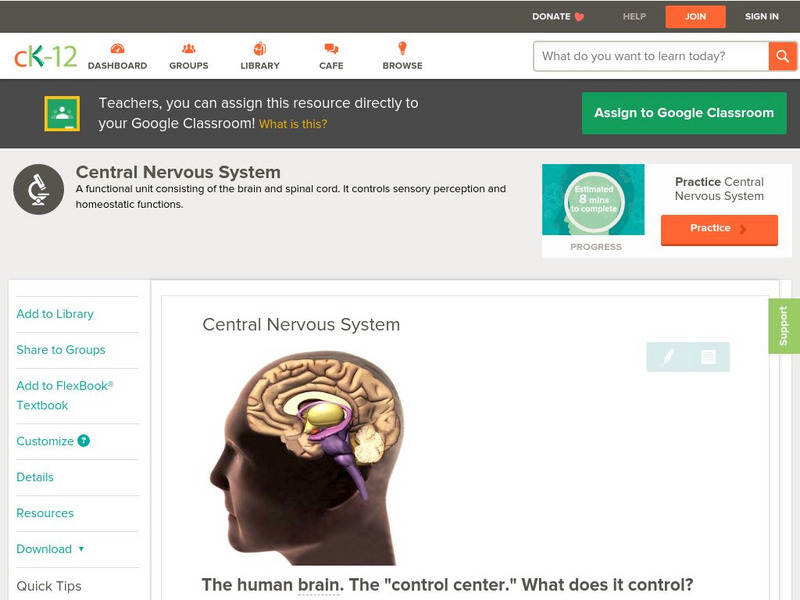TED Talks
Ted: Ted Ed: Eye vs. Camera
Your eyes don't always capture the world exactly as a video camera would. But the eyes are remarkably efficient organs, the result of hundreds of millions of years of coevolution with our brains. The following video and guide outlines...
Other
Psych Web: Psychology: An Introduction: Chapter Three: States of Consciousness
Discusses in detail what consciousness is, its function, how scientists study it, and four different states of consciousness, including sleep, hypnosis, meditation, and psychoactive drugs. Includes comprehension questions throughout.
OpenStax
Open Stax: Anatomy & Physiology: The Mental Status Exam
Students understand the relationship of mental status exam results to cerebral functions in the cerebral cortex.
TeachEngineering
Teach Engineering: Hearing: How Do Our Ears Work?
Students learn about the anatomy of the ear and how the ears work as a sound sensor. Ear anatomy parts and structures are explained in detail, as well as how sound is transmitted mechanically and then electrically through them to the...
National Council of Teachers of Mathematics
Nctm: Figure This: Math Challenges for Families
Students, teachers, and parents alike will enjoy this challenging math site. It contains a clever brain teaser section plus creative problems related to algebra, geometry, measurement, numbers, statistics, and probability. A Spanish...
National Cancer Institute at the National Institutes of Health
Seer Training Modules: Introduction to the Nervous System
Self-guided learning activity where students learn about the structure and function of the human nervous system. There is a short quiz at the end of the lesson to check for understanding.
PBS
Pbs Teachers: Mystery of the Senses Vision
Understand how our brain identifies an object, view six optical illusions and explain why the visual system might interpret them the way it does.
University of Washington
University of Washington: Neuroscience for Kids: Stroop Effect
Do words or colors have more influence over what you read? Try this interactive Stroop Effect test to find out what causes the results.
York University
Classics in the History of Psychology: Principles of Psychology by William James
Complete volumes of the two volumes of this work are available for study.
PBS
Pbs: Misunderstood Minds
A wonderful spotlight on scientific explanations behind learning differences and strategies to aid success in school. Includes profiles of the students in the documentary as well as interactive activities designed to give site visitors a...
California State University
Soccer Safety Tips
California State University provides current research that is finding that heading the ball too often can lead to diminished brain function over time. Heading drills in practice can cause further damage.
Khan Academy
Khan Academy: What Is Depression?
An overview of depression including symptoms, causes, treatment, and brain functions.
Curated OER
Meninges of the Brain
Contains a brief description and diagram of the meninges of the brain. Also mentions the functions of the meninges.
Curated OER
[Gross Functional Subdivisions of the Cerebral Cortex]
Article from Benbest entitled "Chapter 6 -- Basic Cerebral Cortex Function Other than Vision."
Other
Wise Brain: Noble Eightfold Path: Right Mindfulness [Pdf]
WiseBrain, maintained by neuropsychologist Rick Hanson, Ph.D., provides access to articles on Buddhist wisdom and insight. Follow this link to Hanson's explanation of right mindfulness, one of the elements of the Eightfold Path, which...
PBS
Pbs Learning Media: Tools to Be More Present With Students
How we can be in the parasympathetic "rest and digest" state of our nervous system or the sympathetic "fight or flight" at any given moment. In both cases, we can only operate in one or the other brain networks at any given moment. Here...
BBC
Bbc: Gcse Bitesize: How Does the Nervous System Help Us Respond? Ocr 21 C
This lesson focuses on the areas of the brain and the functions of each area. It includes a diagram of the brain with areas labeled, a table of the functions of the areas, and a link to a test.
PBS
Pbs Teachers: Scientific American: Don't Forget! Memory Tests 9 12
Explore scientific research that says continued brain activity may delay or slow the loss of memory function. Investigate and practice different techniques to increase recall.
Wikimedia
Wikipedia: Hypothalamus
This site from the encyclopedia, Wikipedia, provides a brief open-source encyclopedic explanation of what the hypothalamus is and what its functions are. Links are provided throughout this paragraph along with a picture showing where the...
PBS
Pbs Teachers: Scientific American: New Research Into Dyslexia
Research the array of sophisticated technologies scientists use to look closely at the brain. Diagram the major lobes of the brain and explore the functions of the frontal lobe to learn about how dyslexic individuals process information.
Wikimedia
Wikipedia: Neuron
Wikipedia offers an overall description of neurons. This site describes their physical appearance, the different parts of neurons, and what their functions are.
TED Talks
Ted: Ted Ed: The Coming Neurological Epidemic
Biochemist Gregory Petsko makes a convincing argument that, in the next 50 years, we'll see an epidemic of neurological diseases, such as Alzheimer's, as the world population ages. His solution: more research into the brain and its...
CK-12 Foundation
Ck 12: Life Science: Diseases of the Nervous System
[Free Registration/Login may be required to access all resource tools.] The nervous system controls sensing, feeling, and thinking. It also controls movement and just about every other body function. That's why problems with the nervous...
CK-12 Foundation
Ck 12: Biology: Central Nervous System
[Free Registration/Login may be required to access all resource tools.] Covers parts of the central nervous system and their functions.
Other popular searches
- Functions of the Brain
- Biology Brain Functions
- Psychology Brain Functions
- Stimulate Brain Functions
- Estimulate Brain Functions
- Defining Brain Functions
- Functions of Brain Science
